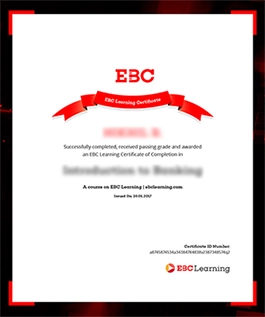Securities in Corporate Law: A Comprehensive Guide From Shares to Hybrid Securities
Master the fundamentals and complexities of securities under corporate law in India

Pay via EBC Webstore
This course will take you through the fundamental concepts of securities under corporate law, like—
- What are shares?
- What are securities?
- What is the difference between shares and securities?
- What are equity shares?
- What are preference shares and what are the different types of preference shares?
- What are debentures and what are the different types of debentures?
to the most complex questions like—
- What are convertible notes?
- What are hybrid securities and how are they treated in India?
- What are differential voting rights shares?
At the end of this course, students will be confident about the various types of securities in India and the regulations governing them.
Who should take this course?
Law Students and Recent Law Graduates, Lawyers, In-House Counsels, Legal Professionals who wish to switch to corporate practice or looking to kickstart a career as Transactional Lawyers, Chartered Accountants, Company Secretaries, Cost & Work Accountants, Government Officials, Academicians, Managers, Chief Executive Officers, Company Directors, Prospective Entrepreneurs, may take this course. The course would help launch law students into a career in corporate law and help practitioners develop their corporate law practice. Business professionals, advisors and managers interested in a detailed legal understanding of corporate affairs may take this course to hone their legal skills.
- 1. 📕 Introduction to Securities
- 1.1 ▸ Introduction
- 1.2 ▸ What is share capital?
- 1.3 ▸ Advantages of share capital
- 1.4 ▸ What are stocks and shares?
- 1.5 ▸ What are different kinds of share capital?
- 1.6 ▸ Practical example of share capital
- 1.7 ✒ Exercises
- 2. 📕 Types of shares
- 2.1 ▸ What are different kinds of shares?
- 2.2 ▸ What are preference shares?
- 2.3 ▸ What are the characteristics of preference shares?
- 2.4 ▸ What are the voting rights?
- 2.5 ▸ What are the different types of preference shares? Part I
- 2.6 ▸ What are the different types of preference shares? Part II
- 2.7 ▸ Issuance of preference shares
- 2.8 ▸ What is the redemption process of preference shares?
- 📚 Readings
- 2.9 ▸ What are equity shares?
- 2.10 ▸ Comparison between preference shares and equity shares
- 2.11 ✒ Exercises
- ☆ Feedback
- 3. 📕 Shares with differential voting rights
- 3.1 ▸ Introduction
- 3.2 ▸ Why differential voting rights are issued?
- 3.3 ▸ What are the conditions under which DVRs can be issued under the Companies Act?
- 4. 📕 Bonus shares, sweat equity and ESOPs
- 4.1 ▸ Introduction
- 4.2 ▸ What are bonus shares?
- 4.3 ▸ What are the advantages of issuing bonus shares?
- 4.4 ▸ What are the disadvantages of issuing bonus shares?
- 4.5 ▸ What are sweat equity shares?
- 4.6 ▸ Who can receive sweat equity under the Companies Act?
- 4.7 ▸ What are the conditions to issue sweat equity under the Companies Act?
- 4.8 ▸ What are ESOPs?
- 4.9 ▸ What are the different kinds of ESOPs?
- 4.10 ✒ Exercises
- 5. 📕 Dividends
- 5.1 ▸ Introduction to dividends
- 5.2 ▸ Types of dividends
- 5.3 ▸ Dividend as part of financial modelling
- 5.4 ▸ Impact of dividend on share price
- 5.5 ▸ What are the conditions for payment of dividends?
- 5.6 ▸ Are there any specific conditions for declaration and payment of dividend from free reserves?
- 5.7 ▸ What is the process of declaring dividend under the Companies Act?
- 5.8 ▸ What is the process of declaring dividend under LODR?
- 📚 Readings
- 6. 📕 Transfer and Transmission of Shares
- 6.1 ▸ What is a share certificate?
- 6.2 ▸ Physical Share Certificates versus Demat Share Certificates
- 6.3 ▸ Are Private Companies Mandatorily Required to have Dematerialised Share Certificates?
- 6.4 ▸ Are Public Companies Mandatorily Required to have Dematerialised Share Certificates?
- 6.5 ▸ What is transfer and transmission of shares?
- 6.6 ▸ Regulatory Framework under Companies Act for Transfer and Transmission of Securities
- 📚 Readings
- 7. 📕 Debentures
- 7.1 ▸ Introduction to debentures
- 7.2 ▸ What are the features of debentures? Part I
- 7.3 ▸ What are the features of debentures? Part II
- 7.4 ▸ What are the different kinds of debentures? Part I
- 7.5 ▸ What are the different kinds of debentures? Part II
- 7.6 ▸ What are conditions for issuing debentures?
- 7.7 ▸ Who can be appointed as debenture trustee and what are the roles of a debenture trustee?
- 7.8 ▸ What is a debenture trust deed?
- 📚 Readings
- 7.9 ✒ Exercises
- ☆ Feedback
Instructors

Madhuri V. Vyas
Senior Compliance Manager, Anand Rathi Shares and Stock Brokers Ltd.
Madhuri is a CS and a Law Graduate with primary expertise in securities market compliances, SEBI laws, corporate law and secretarial compliances. She has previously worked as a CS with Pine Labs Group and as Head CS for Aeroflex Industries Limited, Mumbai.
Certificate
Complete this course and exercises to earn a certificate. Share it with your friends, colleagues, and employers.*
*You must Subscribe to get a certificate.

Limit Reached or Trial Expired
You have reached the limit of 2 audit enrollments or your trial period has expired.
